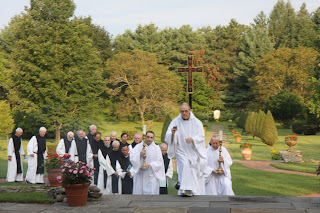I go with my heart and mind to your silent cloisters, from which
the prayer for the Church and for the world continues ceaselessly. And I thank
the Lord for the irreplaceable presence of the monastic communities, which
represent a spiritual richness and a constant call to seek first of all “the
things above”…
Your contemplative life is characterized by assiduous prayer, an
expression of your love for God and reflection of a love that embraces all
humanity. Following the example of Saint Benedict, you do not place anything
before the opus Dei: I urge you to give great importance to meditation on the
Word of God, especially the lectio divina, which is a source of prayer and
school of contemplation. To be contemplative requires a faithful and
persevering journey, to become men and women of prayer, ever more pervaded by
love for the Lord and transformed into his friends.
…your monasteries continue to be privileged places where you can
find true peace and genuine happiness that only God, our safe refuge, can give.
From the very beginning, the Cistercians of the Strict Observance
have been characterized by a great sobriety of life, in their conviction that
it was a valid help in concentrating on the essential and in reaching more
easily the joy of the spousal encounter with Christ.
God manifests himself in your personal solitude, as well as in the
solidarity that joins the members of the community. You are alone and separated
from the world to advance on the path of divine intimacy; at the same time, you
are called to make known and to share this spiritual experience with other
brothers and sisters in a constant balance between personal contemplation,
union with the liturgy of the Church, and welcome to those who seek moments of
silence so as to be introduced into the experience of living with God. May
the Virgin Mary, Mother of God and of the Church, model of every consecrated
life, accompany…the path of the Order with her maternal intercession.
Photograph of Pope Francis meeting our Abbot Damian at the recent General Chapter. Excerpts from the Address of the Holy Father to the participants in the General Chapter of Cistercians of the Strict Observance, on 23 September 2017.





















